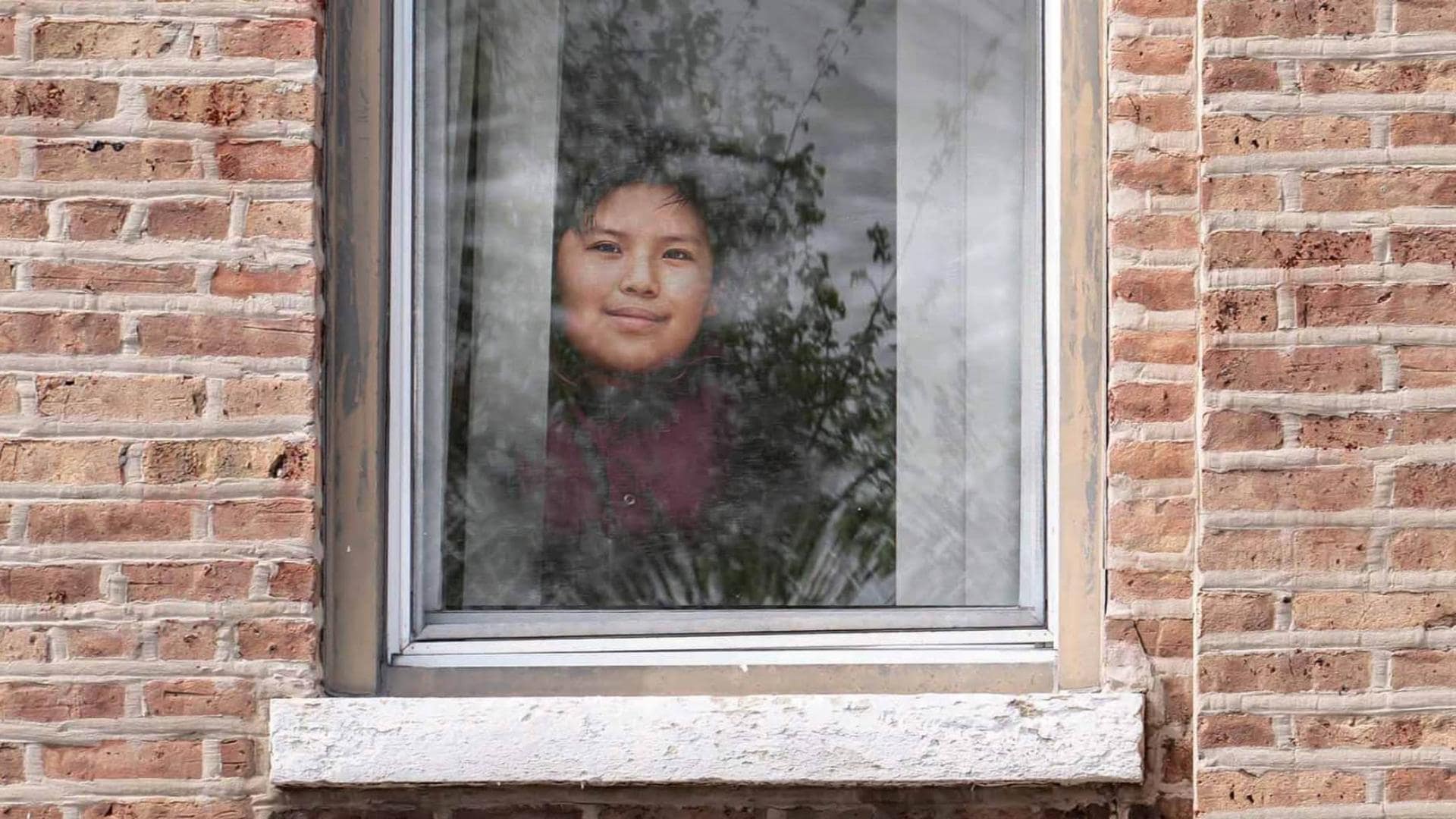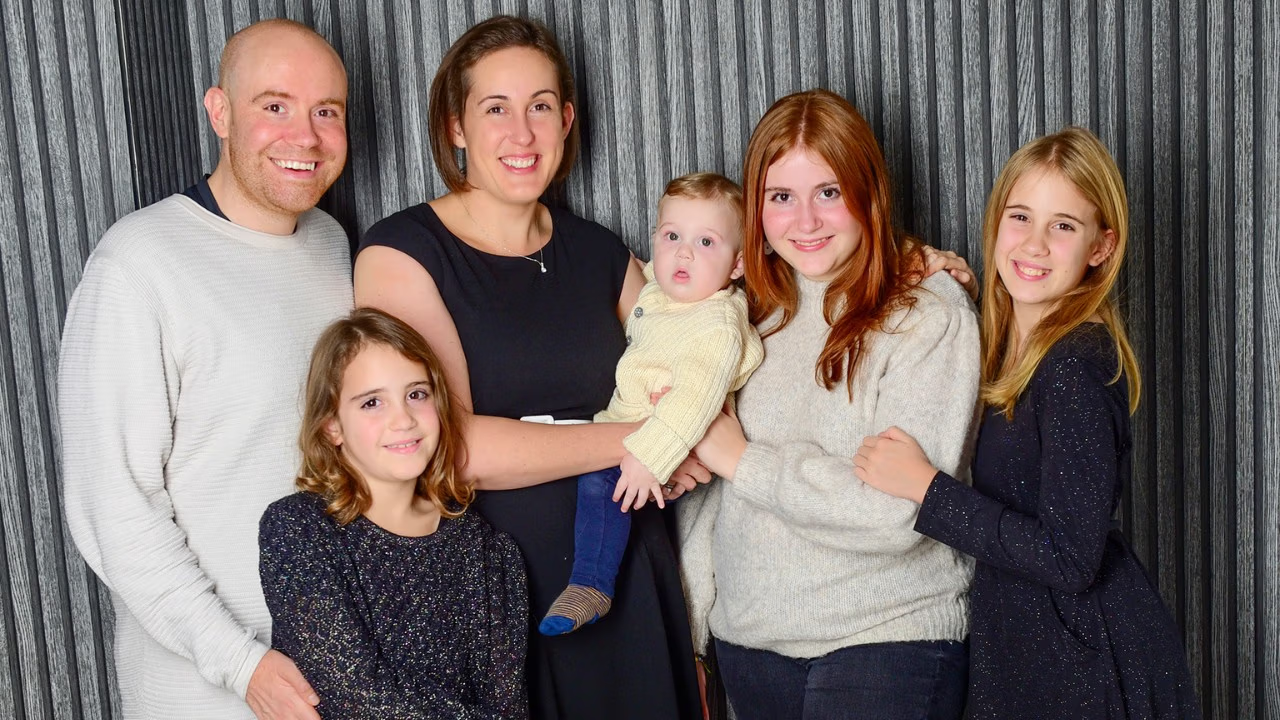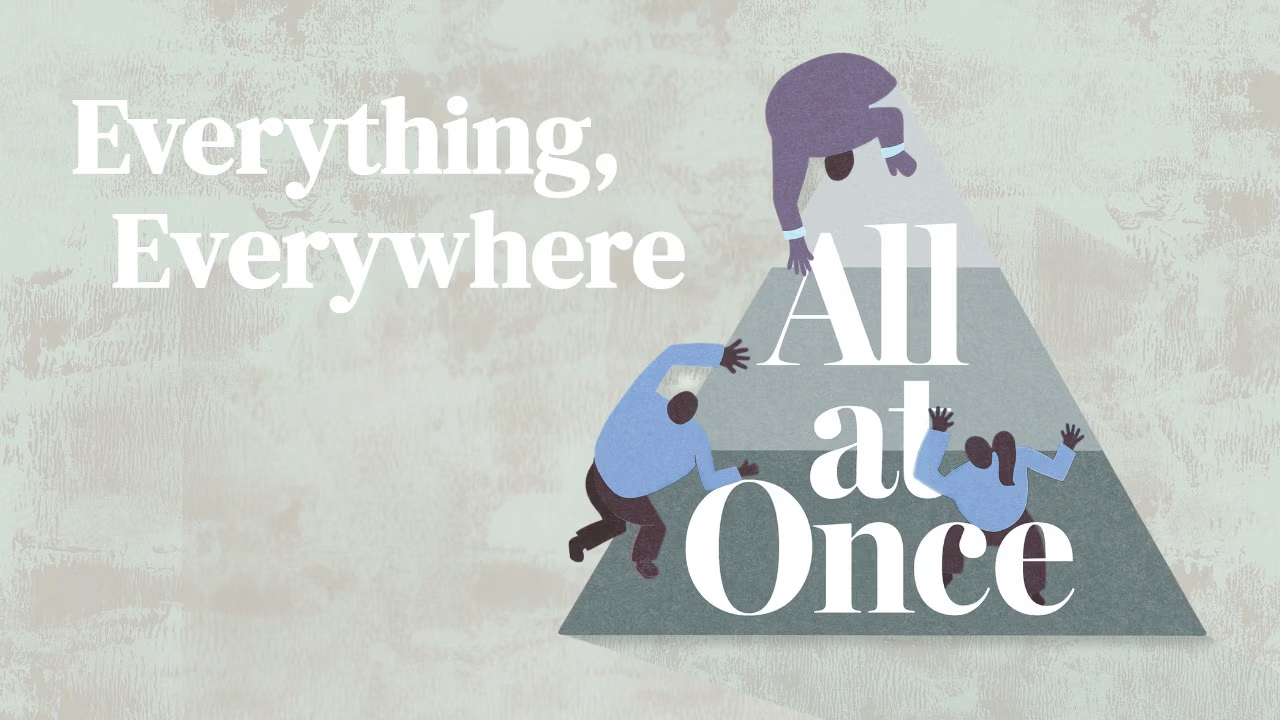Stories of Ministry in a Time Apart
Whether a crisis is personal or communal, it’s the stories that emerge from that difficulty that educate us. It’s the stories that restore our priorities. It’s the stories that make us feel human again.
This year we have faced a pandemic that closed restaurants, stopped travel, canceled graduations, and sent churches online for worship. But ministry kept happening.
While some churches are re-opening and others are still seeking a safe way forward, the Companion sought out various places and points of ministry to tell these stories.
These are the stories of the Covenant—our stories.
by Linda Sladkey
translated by Pia Restrepo
by Nilwona Nowlin
by Erik Strom
by Randall Wilkens
by Richard Moore
by Lisa Orris
by David Sladkey
A Time for Children
by Linda Sladkey
Two and a half years ago, Annie Espinoza suffered a stroke. For three months, the 59-year old Espinoza struggled to walk and talk—sometimes she didn’t even recognize her husband. It was seven months and several hospital stays later before doctors released her to return to work as a full-time registered medical assistant at Advocate Medical group where she has worked for the past 20 years.
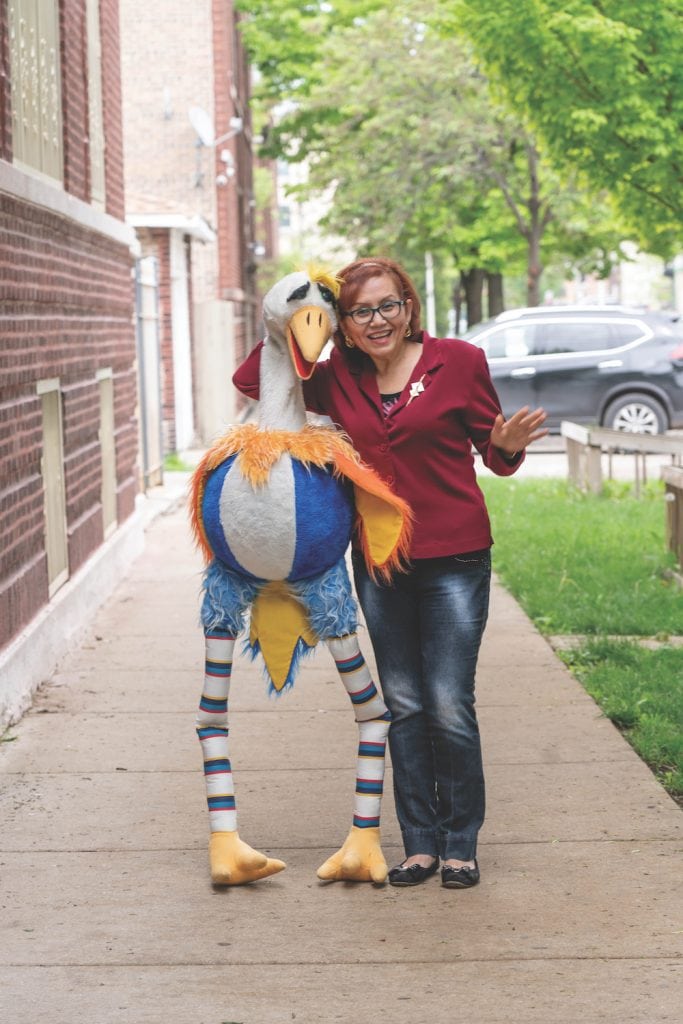
Espinoza holds a bivocational ministry license with the Evangelical Covenant Church. She is co-pastor at Iglesia Pacto Evangelico Douglas Park in Chicago with her husband, Roberto, and director of children’s education. While she sometimes shares preaching responsibilities and works as a counselor for women at the church, her passion is teaching God’s word to young people.
Before her stroke, Espinoza used puppets during Sunday morning services and was training both children and adults to operate the puppets through a group called Hands to Work, which travels to Spanish-speaking churches around the Chicago area to bring a message of love and salvation to children.
“I came from a very poor family in El Salvador. I had very low self-esteem when I was young,” says Espinoza. “I tried to kill myself several times. Not because of my family. They never knew what I was going through. They never knew that I was getting bullied at school because we were poor and my shoes were different, my uniform was different.”
Now she says she can see in the eyes of some of the children at church what they are going through. “I appreciate how the Lord gave me this opportunity that I can be alert in my ministry to the kids.”
While she was recuperating from her stroke, she remembers her 28-year-old son Bryan talking to her about the puppets. “He knew how much I loved them,” recalls Espinoza. “He would show me the puppets and tell me, ‘I know you are coming back.’ But I was not interested at all. I couldn’t coordinate my mind with my lips to bring my puppets to life. I was feeling very depressed.”
She continued to suffer from severe headaches but recovered enough to return to serving her church. She once again saw her puppet ministry thriving and her family began encouraging her to start something new through television or social networks.
“When the pandemic started, I received calls from the kids at my church commenting that they miss going to church and they were missing sister Annie. So on Easter Sunday, I told my husband and my son that I couldn’t wait any longer. Even though the children are not right here with me, my puppets can carry the message of God’s love in these difficult days of staying at home.”
She began using her phone to record a puppet program on Facebook for the children in her community. “My husband gave me a photography set at the beginning of the year with two big umbrellas and lights to use for our yearly family picture day at church,” explains Espinoza. “I love to take photos of the families, many of whom are unable to afford a professional photographer. Since I had all the equipment already, I decided to bring all my puppets from the church to my living room and record from my ‘studio.’ I really appreciate my husband because the room is so full, if you open the door there is no space to walk. Even my cat is afraid.”
Even though the children are not right here with me, my puppets can carry the message of God’s love in these difficult days of staying at home.
Her programs are called El Tiempo con Tiannie (Time with Tiannie), the name her nieces and nephews call her—a fusion of “Tia” which is Spanish for aunt and “Annie.” The 10-minute biblical reflections in Spanish teach around Philippians 4:13: “I can do all things through Christ who gives me strength.” After the very first week, they discovered children were watching from South and Central America and also Spain. They have heard from people in Ecuador, Colombia, Chile, Mexico, Guatemala, and El Salvador.
The programs reassure the children not to be afraid. “The kids don’t understand,” says Espinoza. “One child called me and said, ‘I don’t want my mom to die.’ They feel danger. Some of our families have lost loved ones. We have five members who have lost someone to coronavirus.”
Espinoza’s job at Advocate is to assist doctors with virtual appointments, but she also takes vital signs and prepares patients who have symptoms of the virus to see the doctor in person. Even though some of her coworkers have been infected with COVID-19, Espinoza has remained well. “My family has been worried about me, but my job is an opportunity to show the love of Christ to each person who comes to see the doctor,” she says. “Being a medical assistant and hearing really sad stories—it touched me so much that I started talking with the doctors to get information about how to explain coronavirus to kids and then I applied a Bible message. The main purpose is to let the kids know they are not alone.”
Even though el Tiempo may have begun because of COVID-19 and is geared specifically for children, Espinoza has discovered that adults, some 80 and 90 years old, are watching too. And while she still battles headaches and was even hospitalized in May due to signs of another stroke, she intends to continue her program, expanding it to include an episode in English every two months.
“After the stroke, there were days when I didn’t think I could make it until tomorrow. Now I appreciate that I can do this. Look, I can use my mind and I can talk. Just to think that I can carry the message of salvation through my puppets gives me energy. My headaches didn’t stop but I can still flourish. My heart overflows with gratitude toward God for the honor of allowing me to be a channel to share his eternal love. Maybe this is my last opportunity to do this and I don’t want to waste it.”

Tiempo con los Niños
translated by Pia Restrepo
Hace dos años y medio, Annie Espinoza sufrió un derrame cerebral. Después de este incidente, y durante tres meses, Annie, de 59 años, tuvo dificultades para caminar y hablar, e incluso en algunas ocasiones no reconoció a su marido. Pasaron siete meses y varias estancias en el hospital antes de que los médicos le dieran de alta para volver a trabajar tiempo completo como asistente médica en la organización Advocate Medical, donde ha trabajado durante los últimos 20 años.
Annie tiene una licencia de ministerio bivocacional con la Evangelical Covenant Church. Es co-pastora junto con su esposo, Roberto, de la iglesia del Pacto Evangélico Douglas Park en Chicago y directora de la educación cristiana infantil. Algunas veces comparte responsabilidades de predicación y como consejera de las damas de la iglesia, pero su mayor pasión es enseñar la Palabra de Dios a los jóvenes.
Antes del derrame, Annie utilizaba títeres o marionetas para enseñar a los niños durante el culto del domingo por la mañana y a la vez estaba entrenando tanto a niños como a adultos, el manejo de títeres a través del grupo llamado Hands to Work. Este grupo tiene un ministerio entre las iglesias de habla hispana en el área de Chicago, llevando el mensaje de amor y salvación a los niños.
“Vengo de una familia muy pobre en El Salvador. Cuando era joven, tenía muy baja autoestima”, comparte Annie. “Intenté suicidarme varias veces. No lo hice por mi situación familiar. Ellos nunca supieron sobre mis intentos de suicidio. Tampoco supieron que en la escuela fui victima de acoso por ser pobre, por tener zapatos y uniforme diferentes”.
Ahora, dice Annie, puedo reconocer y entender por lo que están pasando los chicos con solo mirar sus ojos. “Estoy agradecida con el Señor por darme esta oportunidad de estar alerta y pendiente de ellos a través de este ministerio”.
Durante la convalecencia de su derrame, recuerda que su hijo Bryan de 28 años, le hablaba sobre los títeres y los niños. “Mi hijo sabía lo mucho que yo amaba este ministerio”, dice Annie. “Me mostraba los títeres y decía: ‘Mamá, sé que vas a volver a ministerio con los niños a través del arte de los títeres’. Pero aún así no sentía ningún interés ya que no podía coordinar la mente con los labios para darle palabras y vida a las marionetas. Me sentía muy deprimida”.
A pesar de que continuó sufriendo fuertes dolores de cabeza, Annie se recuperó lo suficiente y pudo volver a servir en su iglesia. Después de un tiempo, logró establecer de nuevo su ministerio con marionetas y la familia le animó a empezar algo a través de la televisión o las redes sociales.
“Cuando comenzó la pandemia, recibí llamadas de los niños de mi iglesia comentando que echaban de menos ir a la iglesia y que extrañaban a la hermana Annie. Así que el Domingo de Resurrección, le dije a mi esposo y a mi hijo que no iba a esperar más. A pesar de que los niños no pueden estar físicamente presentes, las marionetas adquieren vida a través del sonido y la grabación y puedo compartir el mensaje del amor de Dios en estos tiempos difíciles y de aislamiento en casa”.
Más tarde, Annie, empezó a usar el teléfono para grabar un programa de marionetas en Facebook para los niños de su comunidad. “A comienzos de año, mi esposo me había regalado un set de fotografía—con sombrillas y luces—el cual usaba para tomar la foto anual de las familias de la iglesia,” cuenta Annie. “Me encanta tomar fotos de las familias, ya que muchas de ellas no pueden pagar un fotógrafo profesional. Como ya contaba con el equipo de fotografía, decidí llevar todas mis marionetas a la sala de estar y grabar desde mi ‘estudio.’ Realmente agradezco la paciencia de mi esposo porque la habitación está llena de marionetas, si abres la puerta no se puede entrar. ¡Incluso a mi gato le da miedo entrar!”
Sus programas se llaman El Tiempo con Tiannie. Sus sobrinos la llaman Tiannie, que es la unión de “Tía” y “Annie”. Las reflexiones bíblicas de diez minutos están basadas en Filipenses 4:13: “Todo lo puedo en Cristo que me fortalece”.
Después de la primera semana de transmisión, se dieron cuenta que había niños viendo el programa desde Centro y Sur América y también desde España. Además se han comunicado con personas del Ecuador, Colombia, Chile, México, Guatemala y El Salvador.
Los programas buscan aliviar el temor que los niños están sintiendo. “Los niños no saben cómo manejar estos sentimientos”, dice Annie. “Un niño me llamó y me dijo: ‘No quiero que mi mamá muera’. Sienten el peligro. Algunas familias de nuestra iglesia ya han perdido seres queridos y por lo menos cinco miembros de nuestra congregación han perdido a alguien por el coronavirus”.
Annie trabaja en una organización medica ayudando a los médicos con las citas virtuales. Además toma los signos vitales y prepara a los pacientes, que tienen síntomas del virus, antes de entrar y ver al médico en persona. A pesar de que algunos de sus compañeros de trabajo han sido infectados con el COVID-19, Annie se encuentra bien. “Mi familia está preocupada por mí, pero sé que mi trabajo es una oportunidad para expresar el amor de Cristo a todos aquellos que vienen al médico”. “Ser asistente médico y escuchar las historias tan tristes de los pacientes me ha conmovido tanto, que hablé con los médicos para aprender más sobre el coronavirus. Ahora puedo hablar sobre el tema con los niños compartiéndoles además un mensaje bíblico. Lo más importante es que los niños sepan y sientan que no están solos”.
A pesar de que el programa el Tiempo con Tiannie empezó debido al COVID-19 y está diseñado específicamente para niños, Annie ha descubierto que algunos adultos mayores, de 80 y 90 años, están siguiendo el programa. Y aunque todavía sufre dolores de cabeza y estuvo hospitalizada en el mes de mayo por síntomas de otro derrame cerebral, su deseo es continuar el programa, y añadirle un episodio en inglés cada dos meses.
“Después del derrame cerebral, hubo días en los que pensé que no era capaz de seguir viviendo. Ahora aprecio y valoro lo que puedo hacer. Tengo y puedo usar mi mente y además puedo hablar. Sólo el saber que puedo compartir el mensaje de salvación a través de mis marionetas me llena de energía. Sigo teniendo dolores de cabeza, pero aún así tengo mucho que dar, quiero seguir floreciendo. Mi corazón está lleno de gratitud con Dios por el honor de permitirme ser un canal para compartir con otros su amor eterno. Tal vez ésta es mi última oportunidad de servir y no quiero desperdiciarla”.
Anointed Grief and the Promise of Revival
by Nilwona Nowlin
Covenant pastor Michael Carrion wears many hats. The founding pastor of Promised Land Covenant Church (PLCC) in New York City recently transitioned from the role of senior pastor to pastor emeritus. He continues to serve as superintendent of PLCC’s Bronx Academy of Promise, regional coach for church planting and development for the Covenant’s East Coast Conference, and also work his “day job” as vice-president of church planting and leadership for Redeemer City to City, a nonprofit organization that resources ministry leaders around the world. All this is in addition to various volunteer roles, including a recent appointment by Mayor Bill de Blasio to New York City’s Faith-based Sector Advisory Council. Yet these days, Carrion is most known for the high number of COVID-19 deaths his congregation has experienced.
At first, this fact was just widely known within the Covenant. Then came the Washington Post article on May 5 with this headline: “A pastor in the Bronx thought he knew hardship. Then his church saw 13 coronavirus deaths.”
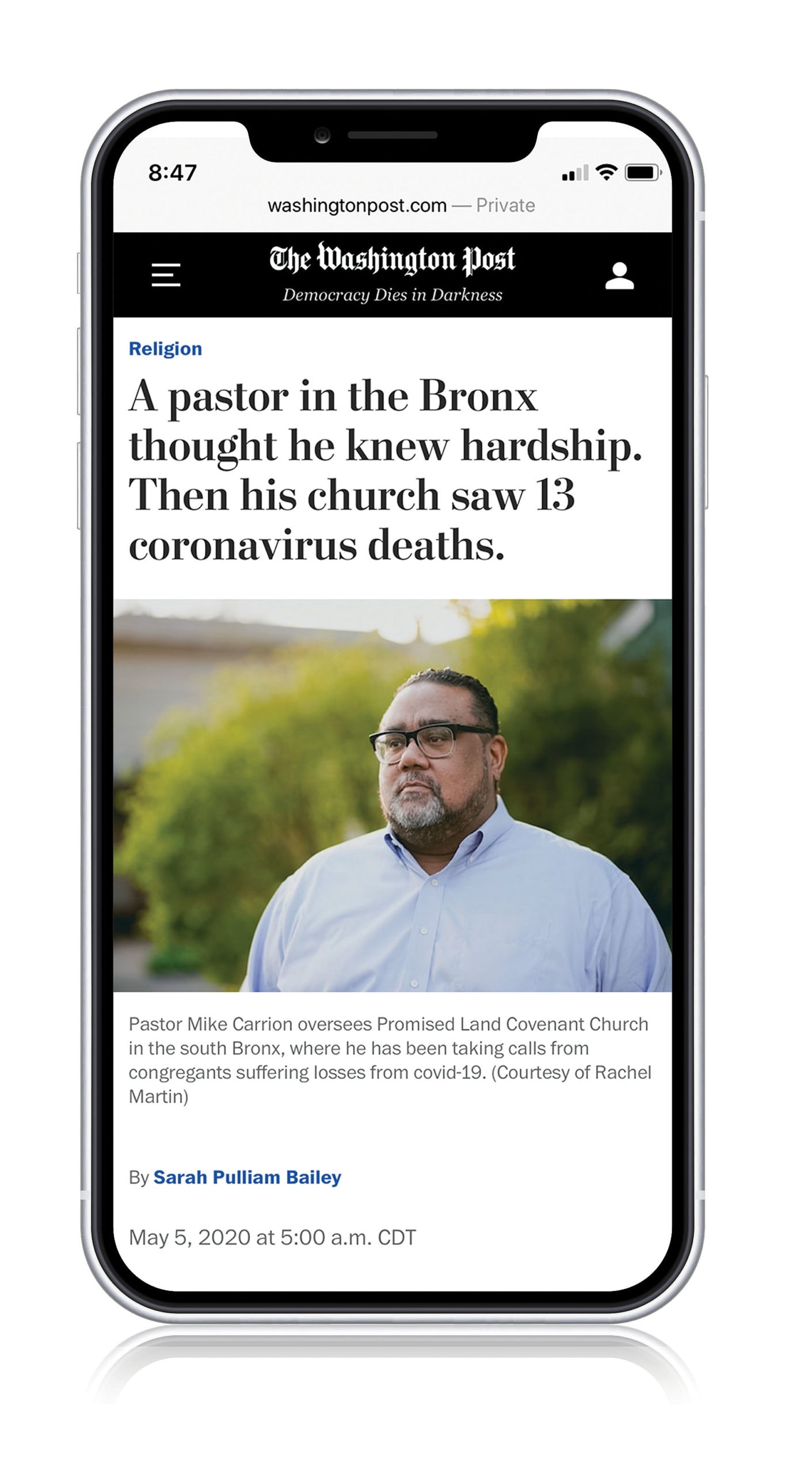
“I don’t wanna be the guy that’s known for all this death,” Carrion said in an interview. He says now that he laments that article. His hope is that people will see beyond the deaths and recognize the ministry that is happening through PLCC, despite the extreme suffering.
The pandemic has disrupted Promise Land’s typical practice of grieving in community. Funerals and wakes are now primarily conducted via a video live-stream with no more than 10 people allowed to attend in person. Carrion recalled one service that took place in the funeral parlor parking lot. They were only allowed eight minutes because funeral parlors’ resources are stretched thin these days. “That’s degrading. As an Afro-Latina community, we mourn together, we come together,” he explained. To not be able to express themselves in the fullness of their culture has left them off kilter.
“In 30 years of pastoral ministry, I have never dealt with the stuff that we’re dealing with now. I don’t care what seminary you graduated from, none of those schools teach you what we’re doing today in New York City,” said Carrion, who holds a master of divinity, a master in theological studies, and a doctor of ministry degrees. He believes the way theological institutions have been training clergy for the last century does not fit the current context. The way he approaches spiritual formation has shifted. It is not enough to know redaction criticism or the finer points of hermeneutics, he says. He must now dig into how to exegete pain in a complex reality. He also explains that it will not be enough to simply deconstruct what has been taught. It must be redefined.
Church members are not only dealing with grief caused by the death of loved ones. They are also struggling with grief from other loss, such as the loss of economic stability, loss of a sense of normalcy.
As a result, much of Promise Land’s ministry efforts have focused on relearning. They are relearning how to connect, how to be empathetic, and how to provide care from a distance. The pastoral staff is carrying a psychological weight they have never had to embrace before. They are now providing care with the understanding that they might walk into a space COVID-free but may walk out infected. Church members are not only dealing with grief caused by the death of loved ones. They are also struggling with grief from other losses, such as the loss of economic stability, loss of a sense of normalcy. Most of PLCC’s members who are still employed are frontline workers who are carrying enormous burdens.
In response, their Bible studies have shifted focus to navigating grief and trauma and caring for others during difficult times. Several members of Promise Land are professors, licensed therapists, and social workers (including Carrion). This group has been instrumental in providing one especially impactful response to the congregation’s needs—a weekly Zoom lecture on the theology of grief and loss in times of uncertainty. The lecture is accompanied by a slide presentation, and participants actively engage through the chat feature. This has been a space where those carrying the burden of grief are able to find community as well as healthy coping skills. “The Zoom sessions have been Holy Ghost-filled!” says Carrion. “What we’ve learned clearly is that you don’t have to be in the same space to be under the same anointing!” He believes that once gathering restrictions are lifted and the city moves into a new normal, Promised Land will continue with virtual learning as a regular part of their programming—especially for those who remain apprehensive about gathering in person.
Carrion says he is grateful to God that he and the church are stronger because of having to quickly respond to a deadly pandemic. He also has hope for the future. “My community was already in a pandemic before the pandemic started. We were oppressed systemically before this,” he says. “But the margins will be the place that sees revival. And it won’t be a virtual revival. It’s going to be a systemic revival that transforms how the church looks in the future.”
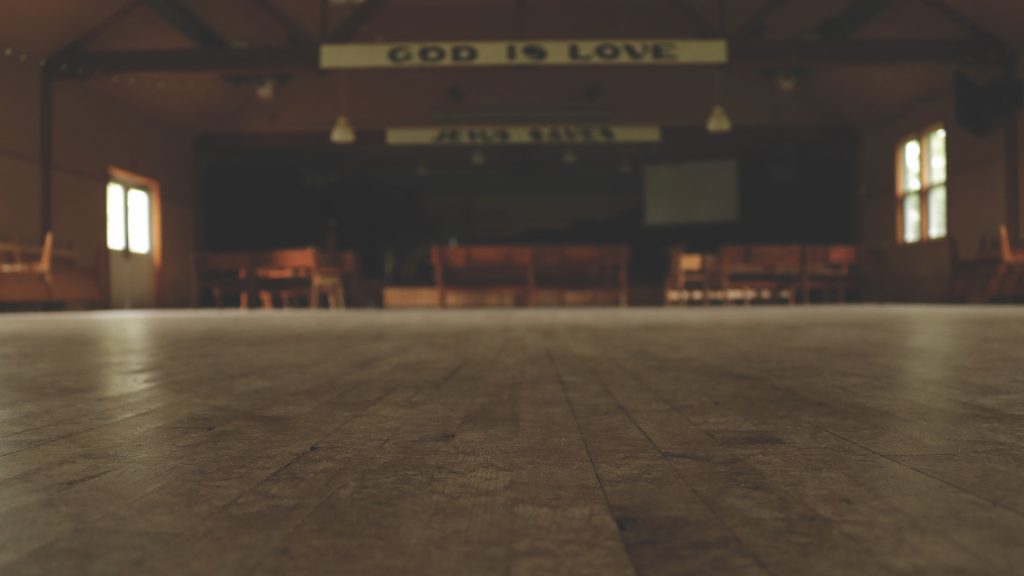
Camp Lament… and Sabbath
by Erik Strom
It’s strangely quiet at camp these days. Normally, the air would be filled with a wonderful cacophony of sounds: the clanking of dishes in the kitchen, the laughter of young people splashing in the lake, the quiet words of a devotional shared early near the cross, the ringing of the camp bell to gather the community for worship, the lawn mower buzzing across the field, and the shrieks of excited summer campers and staff. Yet this summer, following a months-long discernment process regarding the COVID-19 pandemic, programs have been canceled for the first time in 94 years, and those delightful sounds of camp are sadly absent.
Unable to carry out our ministry as we always have, we are faced with challenging questions—questions that I suspect many others are dealing with at some level: As people of faith, what do we do with all the losses we are experiencing personally and collectively? What do we do with the disruption of time and space created by this crisis? What does it mean to be faithful in this time?
At camp, there are always administrative tasks, future program plans, and maintenance projects to be worked on. Even without campers onsite, staying busy isn’t difficult! However, it has become clear that a different sort of “work” is perhaps even more worthy of our attention and time in this season: lament and sabbath.
Lament might be understood as a biblical concept, but it seems to be widely dismissed by the church in practice. We often resist lamenting because it feels easier to get busy trying to fix things ourselves than to sit with the painful reality that we are not in control. Lament requires us to be humble enough to remember that God, though seemingly far off from our current difficulties, is still God—and we are not.
Most Christians would also agree that sabbath is a thoroughly biblical notion, but it also seems to be a command only heeded when convenient to our schedules and terms. It is difficult to cease our activities when we know deep down that so much of our identity and self-worth is wrapped up in our work. Who are we if we stop doing what we do? What will fill our days and our minds? Who will tell me I’m enough? I’m afraid that many of us move from one distraction to another to avoid facing the humiliating truth that our identity and worth will never be found in our accomplishments or wealth, but rather only when we finally rest in God’s love.
At Covenant Point, here in Iron River, Michigan, and for many of our Covenant camps, we are in a season of lamenting a severe disruption to our usual way of life and ministry. The disruption has created ethical dilemmas, financial problems, and ultimately, real and significant losses. I think about the child for whom camp is the one place she feels safe enough to share her painful past; the family for whom camp is their light at the end of the tunnel following a year of hardship; the teenager for whom camp is a place where he can finally not worry about violence and family problems; the summer staffer for whom camp is the place where she will hear her call to ministry.
Our ministry in these past weeks has shifted from busily planning and preparing to gather, to hearing and holding the sadness of our campers and staff. I have sensed the importance of not rushing through the process of lament. I’m seeking to listen carefully to each phone call, respond thoughtfully and personally to each email, and create space together as a staff team to name aloud, and with God, the losses our people are experiencing.
At the same time, we are aware that in some strange way this season is like a sabbath we did not choose. Sabbath was God’s reminder to the Israelites that it was the Lord’s mighty hand who brought them out of Egypt, not their own. Perhaps God has some reminders for us as well through this undesired sabbath. To rest is a countercultural act of faith that fosters healing, delighting in God’s gifts, and reimagining the world as God does. Through this time of lessened activity, my prayer is that as a staff we would receive the great gift of renewal.
This process has not always been easy or encouraging. I have had difficult days that felt unproductive and disorienting. However, we have also received incredible blessings in the midst of the laments: overwhelming love from our camper community, new invitations to serve our local neighbors, and surprisingly a deep, abiding peace. If you read lament psalms like Psalm 13 and 43, you might notice that many of them include a turn toward praise at the end. It’s as if the full expression of grief to God ultimately gives way to healing and redemption.
Like camp, perhaps each of us is being invited in this season to let go of our striving a bit in order to create space for lament—a lament that finally gives way to new awareness, compassion, and deep healing in us and in our communities. Lord, may it be so.

Living Room Liturgies
by Randall Wilkens
For most of us, it happened sometime in early to mid-March. Churches that had never before streamed their services suddenly had to figure out how to do worship online. For my own church, Bethany Covenant in Mount Vernon, Washington, that meant using our smartphones to record from our homes. We call our services “Living Room Liturgies” because they mostly come from the living rooms of our pastoral staff to the living rooms of our congregation. To our surprise, even as we’ve longed to meet together in person, we’ve found there’s something about doing worship in our homes that has been amazingly intimate.
As I’ve sampled online services of other Evangelical Covenant Church churches, I’ve noticed many have taken a similar approach. While not all have shifted to leading worship from living rooms, many churches have chosen smaller spaces within their buildings. Services are then “broadcast” through readily available platforms like Facebook Live and Zoom. There are obvious limitations for worshiping under these conditions, but a few positive trends have emerged.
Worship has become more informal. There’s a homespun feel to these services that stands in contrast to what we may be used to. Churches with previously high production values have had to adjust expectations. Likewise, churches with more liturgy and ritual have had to find ways to adapt. But there’s something that feels uniquely authentic here—a distilling to the essence of what’s important, without the trappings that might have been distractions before. According to Jessica Perez, worship arts director at Crossroads Church in Loveland, Colorado, there’s “no need to over-produce or polish it. People are longing to connect with their own communities authentically.”
Worship has become more intergenerational. By necessity, young and old now are worshiping together. Likewise, worshipers who previously found it a challenge to attend services now have access online. Churches that previously held separate contemporary and traditional services are combining those into one. Worship pastor Chris Logan of Bethany Covenant Church in Berlin, Connecticut, says, “One thing we’ve been very intentional about is our diversity of expression—not just contemporary but also traditional. It’s given me a chance to highlight some of our other types of diversity too, including age, women and men, and a very small but present ethnic diversity.”
Worship has become interactive in different ways. Jedidiah Kim, pastor of worship ministries at Pine Lake Covenant Church in Sammamish, Washington, muses, “I think we have to reconsider our definition of success if the previous definition was physical engagement, people singing and clapping.” Logan invites people to sing with their TV screen or laptop, acknowledging that it probably feels awkward. But he also reminds the congregation, “This is still about doing this together even though we’re apart.” While we may not be speaking to each other in the same room, platforms like Facebook Live have given worshipers a new voice through comment threads. And children, and children-at-heart, have found a freedom in their living rooms to dance, act, or create art in response to worship, where they might have felt uncomfortable to do so in church sanctuaries.
Worship has become more intentional. As a choir director I know that getting people to sing together is hard enough when they’re in the same room, but making it happen on video seems like a minor miracle. Still, we as worship leaders have worked to make such musical collaborations possible because we want to keep lay volunteers involved and engaged. Churches have had to focus on what is important and let go of what isn’t. According to Michael Hill, director of worship experience at Marin Covenant Church in San Rafael, California, “Things have never needed to be more overtly purposeful than in this online environment. ‘Because that’s what we do’ doesn’t fly, as people experience worship music, not shoulder to shoulder but as individuals or families from their sofas.”
COVID-19 has brought with it a significant shift in the way we worship. While some express a longing to return to things as they once were, we know that may not be possible, at least not for awhile. Vocal arts organizations and scientists have warned that singing may carry an increased risk of spreading the virus, and responding to that risk will be a significant challenge for worshiping congregations. But we also have hope that the very tools that helped us withdraw from our worship spaces—everything from visual media to intergenerational worship—will enable us to return to those spaces with grace.
Churches have made decisions based not only on government recommendations, but also with pastoral discernment for both the physical and spiritual safety of worshipers. We have done what we can, but we have seen God do far more. The Holy Spirit has constantly surprised and led us in new, exciting, and creative ways. So I firmly believe that for the worshiping church, COVID-19 has not been so much a crisis as an opportunity. And I’m excited to see what further opportunities God provides with each phase of re-entry, and beyond!

Resetting the Table
by Richard Moore
I was looking forward to celebrating my 25th year as pastor of the Evangelical Covenant Church in Sloan, Iowa, a small rural community of 1,000. We had plans to mark the event with a simple worship time where I could express my appreciation to the congregation for their support, and we would conclude by sharing communion together. In my years at the church, the sacrament of communion has served to emphasize the unity of the body here with Christ and with each other.
Then the pandemic hit. Churches stopped meeting in person, and people sheltered at home. I have tried to reach out to my congregation. I mail coloring pages and activity bulletins to kids and text daily meditations to adults. And I tape pictures of members to the pew where they regularly sit so I can see their faces when I am preaching. But the pictures don’t talk back.
The toughest adjustment for me has been missing out on holy communion.
It has always been an honor to lead us in communion all together as a family. So when church leaders asked me at the beginning of the pandemic whether we would be able to continue celebrating the sacrament, I felt that we needed a tangible way to connect with the congregation, and they needed to connect with each other.
When we gather in person, we normally use wafers purchased from the Hindustani Covenant Church in India. For our virtual service, we bought pre-filled communion cups and wafers that are packaged together. Some people came by to pick them up from the church and deliver them to others who could not pick up their own.
The first time we celebrated “virtual communion” was awkward. Typically I invite the servers to come forward and they distribute the elements—first the wafer and then the juice. Instead, people already had the “to go” version with a seal over the unleavened wafer and a second seal over the grape juice.
The Covenant Book of Worship invites us to prepare thoughtfully to enter into the sacrament: “The table should be prepared carefully, and the table and the elements may be covered with clean, white cloths. The elements may be present before the people from the beginning of the service, or they may be brought forward with the offering of the gifts of the people.”
But there would be no clean, white cloths, no bringing forward of the elements. I almost didn’t want to celebrate the sacrament because
it felt so out of place, so separated from our broader historical tradition. Yet we had also had a strong local tradition of celebrating together.
I decided that during our worship service, I would repeat the words of institution, hold up my wafer, partake, and then repeat with the cup. Four of us were in the church building during the service—the pianist, camera operator, my wife, and me. We sat the appropriate distance apart, each with the self-serve cup sitting next to us.
It didn’t go well. The wafer and cup packages were difficult to open. I could not see a video screen of people participating, but I did see the cameraperson watching the live-stream with a concerned look. Later I learned the live-stream had cut out before I offered the words of institution. (Fortunately, most people thought it was just a planned pause to allow folks to take the elements on their own after quiet meditation!)
This was not what I dreamed when I looked forward to beginning my 25th year of ministry in Sloan. It felt like a disaster.
Virtual communion still reminds us that we are all part of the universal body of Christ, which, in some sense, has always been somewhat virtual.
Since then, I have taken time to reflect on the Lord’s Supper and what it means to eat both apart and together at the same time. I remember that communion isn’t about me, despite my disappointments and frustration.
Virtual communion still reminds us that we are all part of the universal body of Christ, which, in some sense, has always been somewhat virtual. We do not celebrate lightly, and we remember the words of 1 Corinthians 11:29: “For if you eat the bread or drink the cup without honoring the body of Christ, you are eating and drinking God’s judgment upon yourself” (NLT). We who celebrate the Lord’s Supper online do not do so lightly—but we do receive the elements differently.
If we paraphrase the words of the Apostle Paul in Romans 8 today, we might say something like this: “I am convinced that nothing can ever separate us from God’s love. Neither death nor life nor positive coronavirus tests, nor a lack of public worship nor self-isolation, nor our fears for today or our worries about tomorrow—not even the powers of hell or social distancing can separate us from God’s love. No power in the sky above or in the earth below or hiding on a microscope slide—indeed, nothing in all creation will ever be able to separate us from the love of God that is revealed in Christ Jesus our Lord.”
We are never separated from the love of God in Christ Jesus—even when we cannot celebrate the Lord’s Supper together.
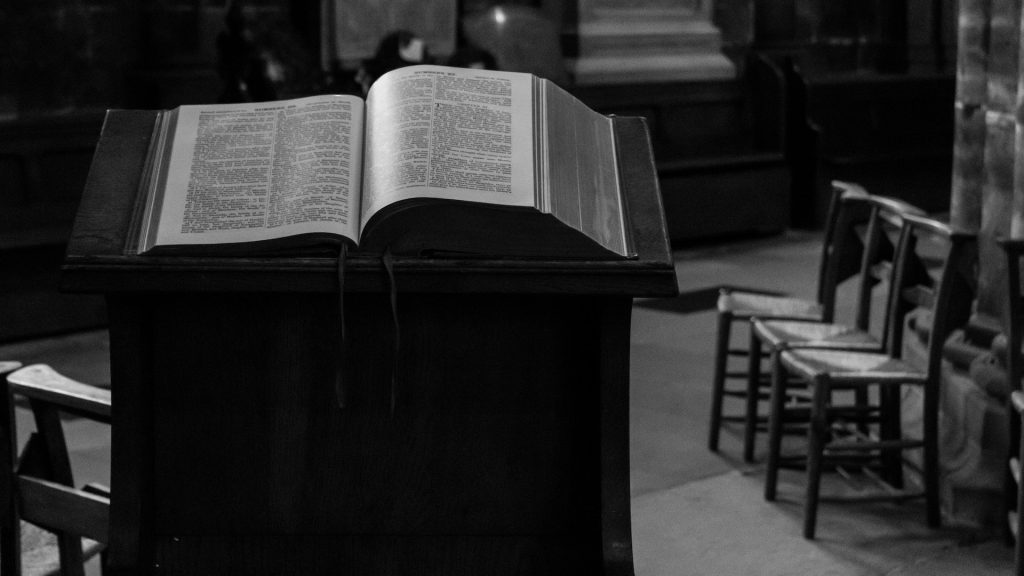
The Lonely Pulpit
by Lisa Orris
As a pastor, I’ve been forced to do a lot of things during this season of COVID-19 that have been very uncomfortable for me. I pastor a small church on the corner—literally—about 50 miles outside Chicago. At Hope Church, we don’t have the resources to create a major online presence during the pandemic. We are using what we have to make connections. We are gritty, not glitzy. We don’t do lattes, and we have never been about entertaining anyone.
So for me to go in front of a camera has been terrifying and awkward.
But the most significant thing I have learned about myself and my church is that the preaching moment has always been about a relationship. I am not a lecturer downloading information. I don’t preach to our congregation. I preach with them.
This is why I miss them so much and why the cameras, the filming, and the production feels so awful. There is no one there!
I don’t miss them because I need applause, approval, or “amens.” (Although they will all tell you that I do appreciate a good, loud amen now and then!) I miss them because they help me preach the good news. They help me every week to be faithful to the gospel as we live life together.
They help me when I get stuck in a thought or when I’m overcome with emotion. They help me remember who God is when I’ve wandered away in my doubt, grief, anger, or confusion. They help me to believe that I am not alone when I am up there in front of them, because they are right there with me.
This is why I miss my church, my community, my people. Not because I have to tell myself I preach to an audience of one, whether the church is full or not, to bolster my sense of call or pastoral identity. I miss them because they have never been an audience. They are the people who have helped to form and shape me as a pastor and as a person.
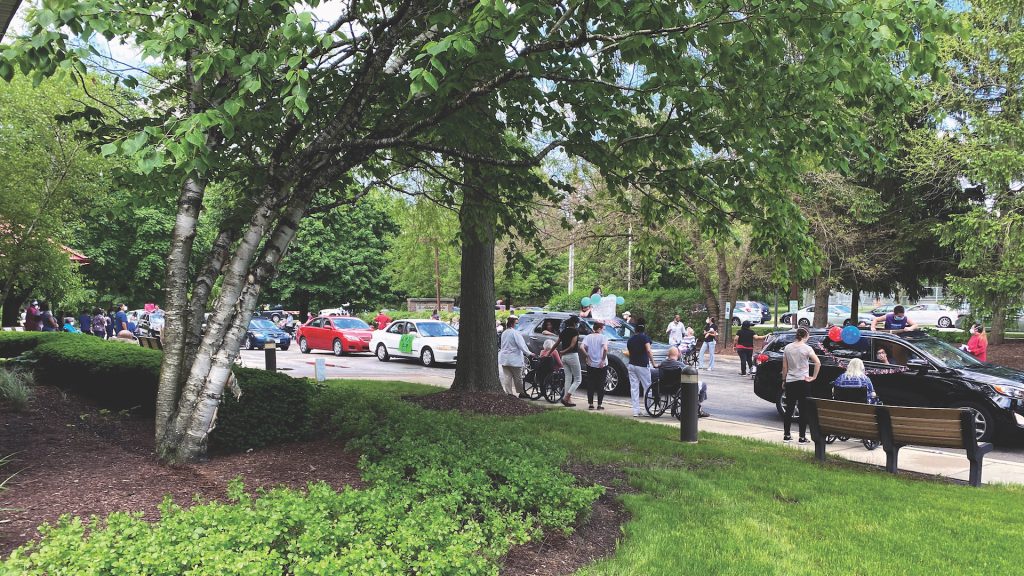
Waiting for the Word
by David Sladkey
I have avoided walking past the nursing home on my daily walks. I’ve wondered if I could go in and ask the receptionist if my friends are okay. Are Kenny or Ernestine sick with COVID-19? What about Ella, Pat, Joyce, Bill? Actually, I wonder if they are still living and if I’m really ready to know. Pandemic restrictions bar me from even entering the lobby, and patient confidentiality prevents me from knowing any more than what I read in the paper, but these are my friends. They almost feel like my family.
These are the residents of Alden Estates, the nursing home our church visits on a weekly basis. For the past 24 years, a team of laypeople from Naperville (Illinois) Covenant Church has been providing a Sunday morning worship service there. We sing hymns and give a short message. We celebrate communion once a month and sometimes make crafts together. The residents love it when the children of the church come during Sunday school to sing or deliver cards. At Christmas, we carol in the halls and each summer we do some gardening together on their patio and play Bingo—you can learn a lot about the residents during Bingo. And occasionally we are called on to deliver their funeral homilies because we are the only church some residents have.
Our last worship service at Alden was March 8. They have been in lockdown and we have not heard from them since then. I have learned from a state sponsored website that at the time of this writing, 87 of the 131 residents have been sick with COVID-19. Twenty-two have died.
A message was left on the church answering machine recently saying Fred, an Alden resident and weekly attender, has COVID-19. Sue, his wife, made the call and asked for prayer for Fred and for all the staff. She left no number for us to return her call, but I could hear the pain in her voice. My helplessness is profound. This is a churchwide loss with no end in sight.
We have a dedicated team that rotates leading the Sunday worship service at Alden each week. But very few ministries last unless they are reciprocal. These residents give back to us all that they have—a hand, a smile, a thank you. A year ago when I told a resident, Aurelia, who rarely speaks, that my mom had recently passed away, she tenderly took my hand and said, “I’m sorry for your loss.” I was a tearful mess, but those gifts remind me that everyone has something to give.
And then there’s Kenny. Kenny always greets me the minute he hears my voice. He knows my interests and asks about my family. Blind and confined to a wheelchair, Kenny has lived in the nursing home since before we started our ministry in 1996. He lives life with a positive attitude and a Christlike walk. He has never attended school and his speech is difficult to understand, but he has taught me more about faith and compassion than any book, sermon, or devotional. Kenny has been my friend for 24 years, and I have had no way of keeping in touch with him. Does he have the virus? Has he passed away? These questions haunt me.
Kenny has been my friend for 24 years, and I have had no way of keeping in touch with him.
A few days ago, I recognized the name on the caller ID of my phone—Danielle from the activities department at Alden. I had been trying to reach her to find a way for our church to connect with residents. Danielle invited us to a car parade set for the following week. Residents would be brought out to the sidewalk while the cars passed by. Our ministry team and our whole church could finally have an outlet for our anxious hearts. As I talked with Danielle about the details, I knew I needed to ask about some of our residents, specifically Kenny. I’m usually pretty direct, but I found myself stalling. When I finally asked, Danielle told me Kenny had passed away. She said that even though he had COVID-19, he had been doing fine. But then he had a really hard day, and he passed away the next day on May 9. I was so flustered that I said goodbye without asking about any other residents. As I made calls to the other ministry team members, we just wept.
The ministry at Alden Estates is used to seeing death. The progression is usually slow but steady. We can see a resident decline a little bit each week and often pray for them, knowing the end will be coming soon. Most of the time we have a chance to say goodbye. It may sound odd, but their death is natural and peaceful. With our current lack of connection and communication, the death of Kenny and others feels jolting and painful. I know God was with Kenny in those weeks and days he was sick. I just wanted to be there too.
The car parade helps ease the tension of not being able to do anything for our friends at Alden. Driving past the residents honking and waving signs makes us feel like we can connect with them, even for a brief moment. But it does not replace our anxiety about what happens next. What does the future hold? How can we regain community when our friends’ lives are in danger?
At least we can pray. And we do pray—for comfort, wisdom, and guidance as we hope to continue our ministry of relationship with our dear friends. It is a shift from the hands-on ministry we are accustomed to, but I am gaining peace as I continue to learn about the many different ways that God is at work. This has to be enough.


